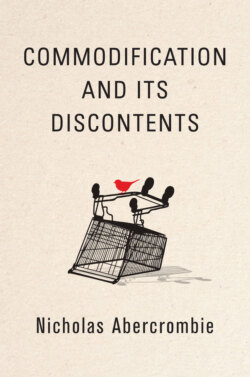Commodification and Its Discontents

Реклама. ООО «ЛитРес», ИНН: 7719571260.
Оглавление
Nicholas Abercrombie. Commodification and Its Discontents
Contents
Guide
Pages
Dedication
Commodification and Its Discontents
Copyright page
Acknowledgements
1 Money Talk
Regimes of Value
Money and Markets
The Argument of this Book
2 Land
Law, Land and Property
Land Use Regulation in the UK
Ideology and Moral Climate
The 1970s Watershed
3 Bodies
The Dead Body
The Live Body
Public Health
National Insurance
The National Health Service
The 1970s Watershed
4 Books
Specialness
Booksellers Become Publishers
The Golden Age
The Good Book: Culture and Ideology
The 1970s Watershed
5 Sacredness and Property
Tradable Objects
Economic Subjects
Property
6 Moral Regulation
The Morality of Markets
State Intervention and Moral Regulation
The Varieties of Moral Regulation
The Problem of Scale
The Leakiness of Moral Regulation
7 Moral Climate, Ideology and Intellectuals
The Structural Position of Intellectuals
Relative autonomy
Cultural authority
Networks
Moral Climate, Audiences and Social Movements
Ideology
Conservatism with Socialism as Moral Climate
Ruskin, Wells, Eliot and Mannheim
Decline and Fall – or Change?
8 Moral Complexity
The Long Century and After
Moral Complexity and Hostile Worlds
Transactional Orders
References
Index
POLITY END USER LICENSE AGREEMENT
Отрывок из книги
This book is dedicated to:
Very many years ago, Stephen Hill, Bryan Turner and I wrote a book called The Dominant Ideology Thesis from which are derived several of the ideas in the present book. I am very grateful to both, not only for that book, but also for a productive collaboration over a dozen years or more and a lasting friendship. More recently, several people have helped with their special expertise. Joe Abercrombie has shared his detailed knowledge of Star Trek, Rob Abercrombie has taught me about the relationship of charitable organizations to the market, Adam Roberts has educated me about science fiction, Andrew Sayer pointed me towards the literature on moral economy, Boyd Schlenther introduced me to work on the sacred, Michael Tichelar spent much time talking about town planning, and John Troyer and Tony Walter of the Centre of Death and Society at Bath University got me started on the human body. Over the period in which I have been writing this book, Bath University has generously provided me with an academic home for which I am very grateful. Four friends – Bren Abercrombie, Richard Little, Michael Tichelar and Linda Watts – have been foolish enough to agree to read the entire manuscript and I am very grateful to them for their friendly advice. Polity’s anonymous readers very kindly and helpfully commented on early drafts of the book. Polity’s staff – Jonathan Skerrett, Karina Jákupsdóttir and Rachel Moore – were uniformly calm, considerate and effective, and Fiona Sewell made a magnificent job of copy-editing the manuscript in a very short time.
.....
Ideologies are rarely subtle and Money Talk is no exception. Typically, it is strident, simple, evangelical even. It does not admit of shades of gey, but only black and white. Money Talk does not inhabit a complex moral universe. It sees itself as part of a struggle with a world corrupted by money. This Manichaean quality is, in turn, a feature of another and crucial characteristic. Money Talk is usually oppositional. It constructs an enemy.
Money Talk may be contrasted with another ideology that I shall call Coined Liberty. The phrase comes from Fyodor Dostoevsky’s The House of the Dead, in which the possession of money is explicitly associated with the small degree of freedom that can be bought in prison, for ‘money can always and everywhere be spent, and, moreover, forbidden fruit is sweetest of all’ (Dostoevsky, 2004: 13). (Dostoevsky, however, does not appear to endorse this viewpoint in his other novels. Indeed, in these, his more sympathetic characters seem rather to be promoters of Money Talk.) The main principle of Coined Liberty is freedom, freedom of the individual subject, that is. But its main expression, in modern times at least, is the free market and the conditions that promote it. That freedom is held both to underpin and also to flow from individual liberty. In addition, free markets are claimed to be dynamic and fostering of innovation, increasing prosperity which finds its way to all members of society. Like Money Talk, Coined Liberty has a long history and has generated an enormous literature.
.....